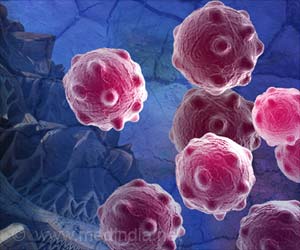
‘Triple combination of T-VEC, trametinib and a PD-1-targeting monoclonal antibody, which lead to even greater tumor eradication in a melanoma mouse model. ’
Tweet it Now
Around half of all melanomas are driven by mutations in the BRAF gene, and drugs that inhibit BRAF or MEK - another gene in the same pathway - have significantly improved outcomes for many patients. But treatment resistance often develops, particularly when several BRAF/MEK inhibitors are combined. Immune checkpoint inhibitors targeting molecules like PD-1 that prevent the immune system from attacking tumors have also led to major improvements, but combining checkpoint inhibitors can have toxic effects. Oncolytic viruses, which can directly infect and kill tumor cells and activate innate and adaptive immunity, are another way of directing the immune response against cancer. The virus used in this study, was the first and is still the only to receive FDA approval, based on a clinical trial led by Kaufman when he was at the Rutgers Cancer Institute. In the current study, he and his colleagues first investigated the potential of combining the BRAF inhibitor vemurafenib with T-VEC in both human melanoma cell lines and mouse models of melanoma. While that combination led to increased cell killing in BRAF-mutated cell lines, the investigators were surprised to find that combining T-VEC with the MEK inhibitor trametinib - originally used as a control - increased cell death in both BRAF-mutated and unmutated melanoma cell lines. They then verified these improved results in an immune competent mouse model of melanoma and identified several aspects of the underlying mechanism, including its reliance on both cytotoxic CD8+ T cells and a group of dendritic cells and the generation of an inflammatory response characterized by increased PD-1 and PD-L1 expression.
Overall, while the use of T-VEC or MEK inhibitor trametinib alone produced a treatment response in around 20 percent of animals, combining the two increased the response rate to 50 percent, and the triple therapy to almost 100 percent. The researchers also tested both double and triple combinations in a mouse model of colon cancer and observed similar results - survival was significantly improved when T-VEC was combined with either trametinib or anti-PD-1, and the triple combination complete eradicated the tumor in all mice treated. "While we still don't know the mechanisms behind effects such as the improved response against tumors that lack BRAF mutations, an interaction between T-VEC and trametinib appears to be involved," says Kaufman. "The data from the colon cancer models suggests this combination has potential beyond treatment of melanoma. Now we need to develop appropriate clinical trials to see if this approach will benefit patients with melanoma and other types of cancer."
Source-Eurekalert











